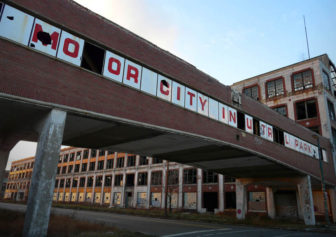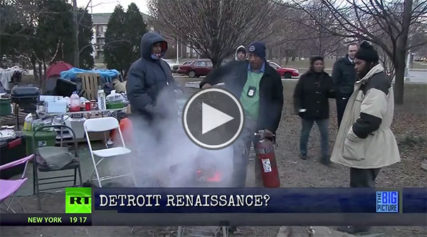With possible bankruptcy looming, Detroit’s emergency manager Kevyn Orr presented a painful recovery plan yesterday that would spin off the city’s water department, reduce city-provided health care for retirees and pay as little as 10 cents on the dollar to many of Detroit’s debtors.
Orr wants to reinvest $1.5 billion over the next decade to boost crucial public services like police and fire and transform the antiquated city government.
“Detroit’s road to recovery begins today,” Orr said. “Financial mismanagement, a shrinking population, a dwindling tax base and other factors over the last 45 years have brought Detroit to the brink of financial and operational ruin. We cannot repeat the mistakes of the past — the city, its region and the country deserve better.
“Our plan,” he added, “is bold because aggressive action is required to get Detroit back on its feet and improve the quality of life for the people who call Detroit home.”
Orr first met with two consultants to solidify how they would deal with as much as $20 billion that the city owes. They then held a briefing with as many as 150 creditors in a bid to win an out-of-court settlement. They are trying to get creditors to agree to a payment deal before the city has to resort to bankruptcy.
Creditors including retirees, bond holders and current city workers are likely to get less than 10 cents on the dollar for the city’s unfunded liabilities, such as unsecured bonds and pension and health-care benefits, that the city doesn’t have the money to pay.
“This is not meant to be a hostile act,” Orr, a bankruptcy lawyer brought in from Washington, D.C., said at a news conference after the meeting with creditors. “It isn’t meant to be combative. It is meant to be an acknowledgment and recognition of the realities that we can no longer deal with.”
Orr is scheduled to meet next week with labor leaders and retirees. Many expect that his proposals to reduce health-care benefits for retired city workers will end up in court.
Orr announced that he would simply stop making some of Detroit’s debt payments, including $39 million that was due to creditors on Friday, because the city doesn’t have it.
“What the average Detroiter needs to understand is that we’re tapped out,” he said.
Orr is also proposing that the Detroit Water and Sewerage Department be spun off to an independent authority still owned by the city but managed by a board of representatives from the city and its suburbs. Under this program — already proposed by regional leaders — Detroit would end up making tens of millions a year in revenue from the department, money it cannot now make from the public utility, reports USA Today.
In response to the city’s financial distress, the rating agency Moody’s downgraded several of Detroit’s debt obligations on Thursday. On Friday after the meetings, it raised the prospect of further action.
“We also believe the city’s risk of bankruptcy has increased over the last six months,” Moody’s said in a statement. “All of Detroit’s ratings remain under review for possible downgrade as we analyze the ongoing discussion between the city and its creditors and stakeholders.”
Detroit would become the largest municipality in the nation to file for Chapter 9 protection if it came to that. Orr put the odds of bankruptcy at 50-50.
While city and state leaders have said bankruptcy is a last resort, the threat of it may be enough to persuade creditors and union officials to embrace voluntary cuts so that they can have a say in how much they receive of the money owed, rather than leaving it to bankruptcy court. But there may still be reluctance on their part because some of them believe Orr is exaggerating the extent of the problem.
James E. Spiotto, a bankruptcy specialist at the law firm of Chapman & Cutler in Chicago, told the New York Times that since 1954 more than 60 cities, towns, villages or counties have filed for Chapter 9.
Large cities in financial trouble, such as New York and Cleveland in the 1970s and Philadelphia in the 1990s, have found other means to resolve their fiscal woes without resorting to the stigma of bankruptcy, which could bring untold legal costs and unknown market repercussions to a city as large as Detroit, which has 700,000 residents.
“We don’t know with a municipality that size and that much debt what effect, if any, it will have,” Spiotto said. “It would be a change from what historically has happened, and we can’t rule out that there might be consequences.”
“This is on their balance sheets,” Delia Enright, president of a local union that represents civilian police workers like 911 operators, said of the cuts to retirees. “But this is on our lives.”


